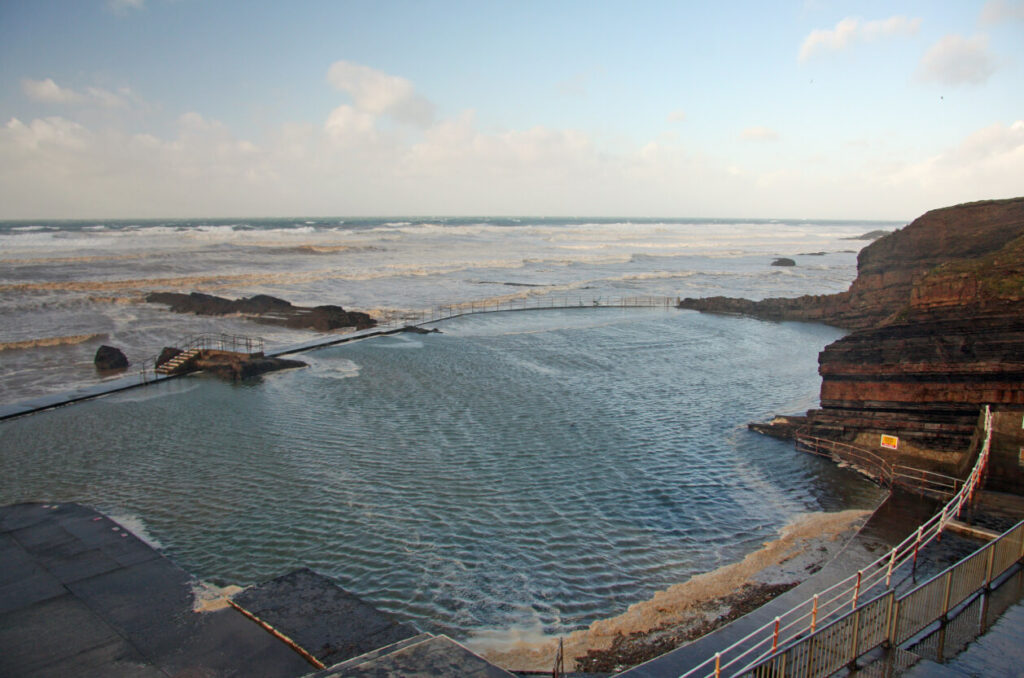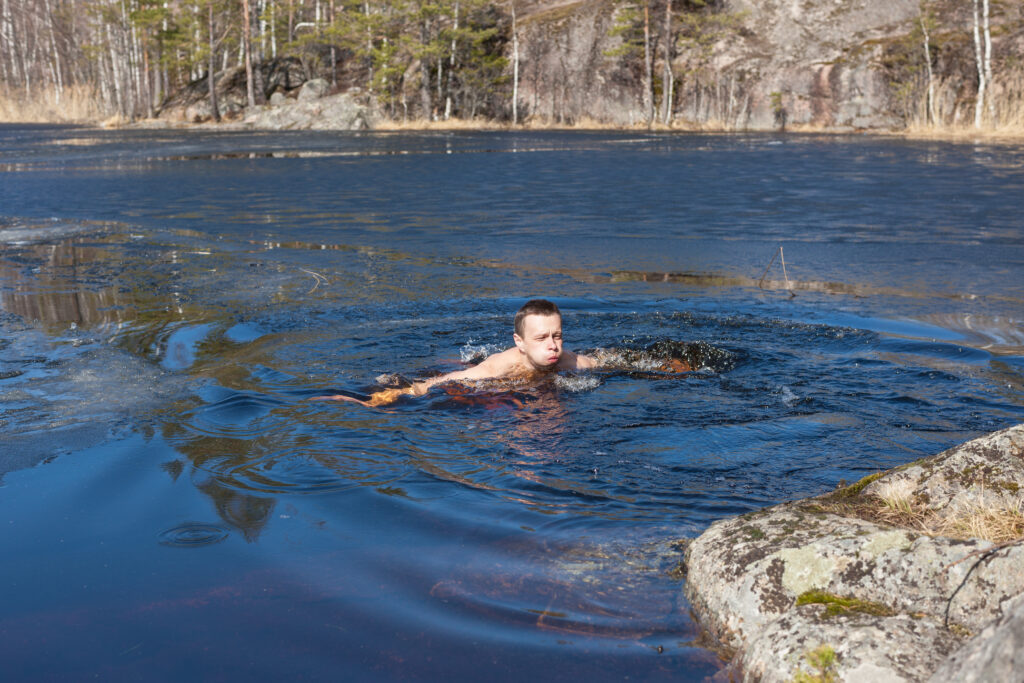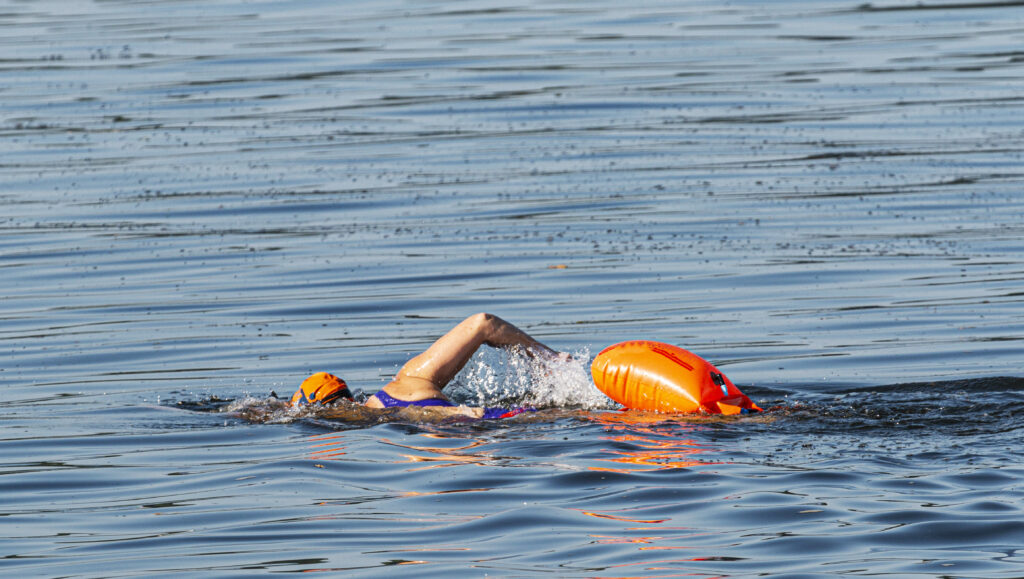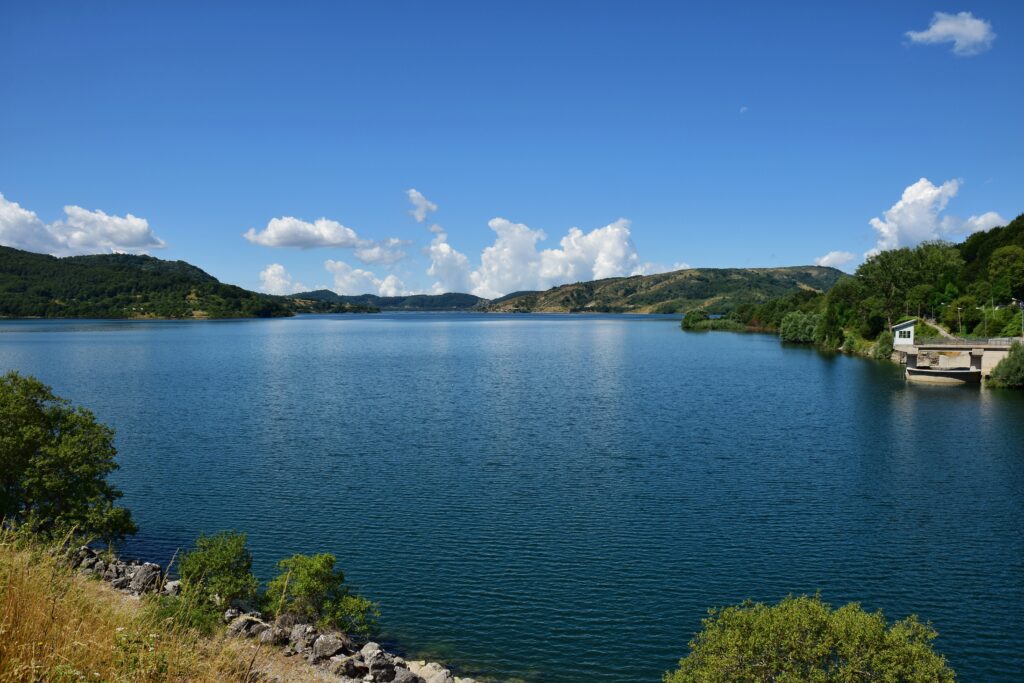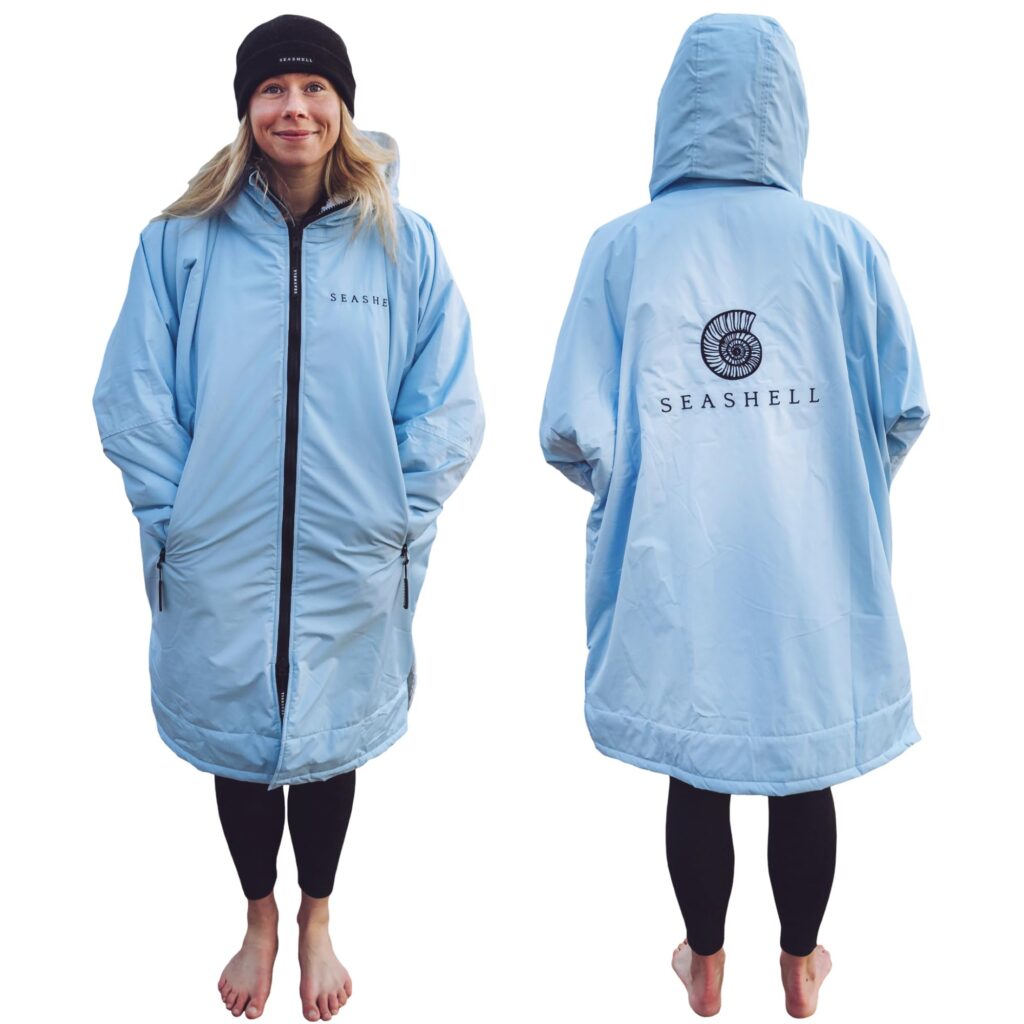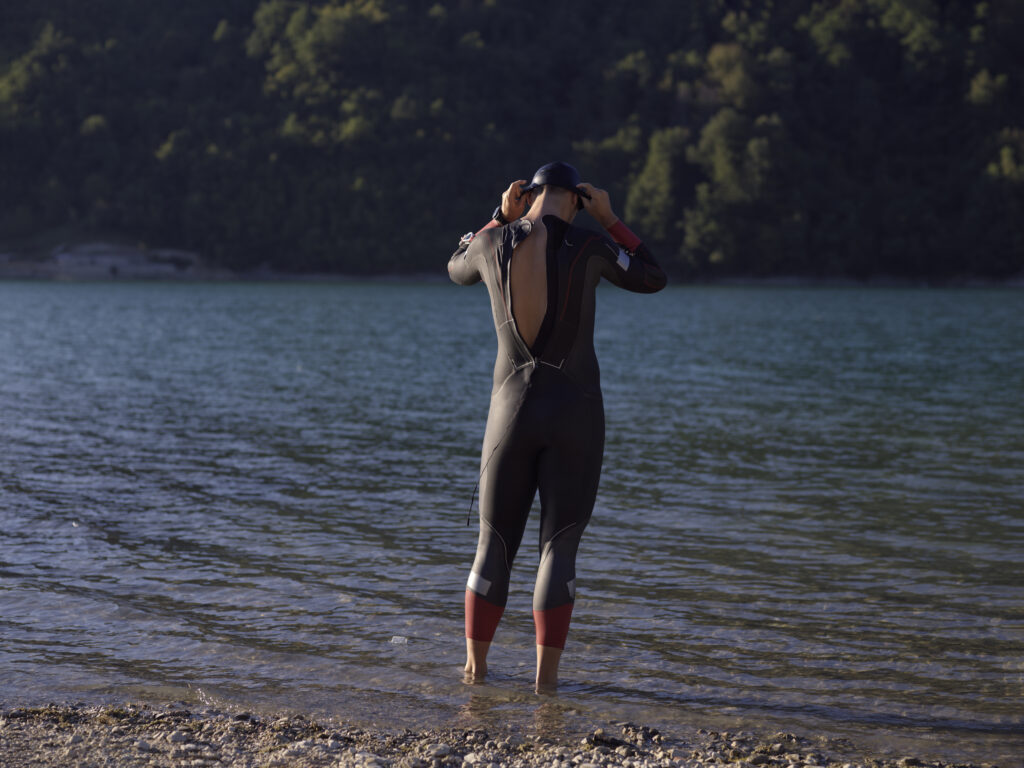Fuelling your body properly for an open water swim race can make the difference between hitting the wall mid-race and powering through to the finish line. The right foods help maximise your energy stores and maintain performance throughout your swim. For optimal performance, focus on consuming easily digestible carbohydrates like oats, bananas, and energy gels, along with adequate protein and hydration before and during your swim race.
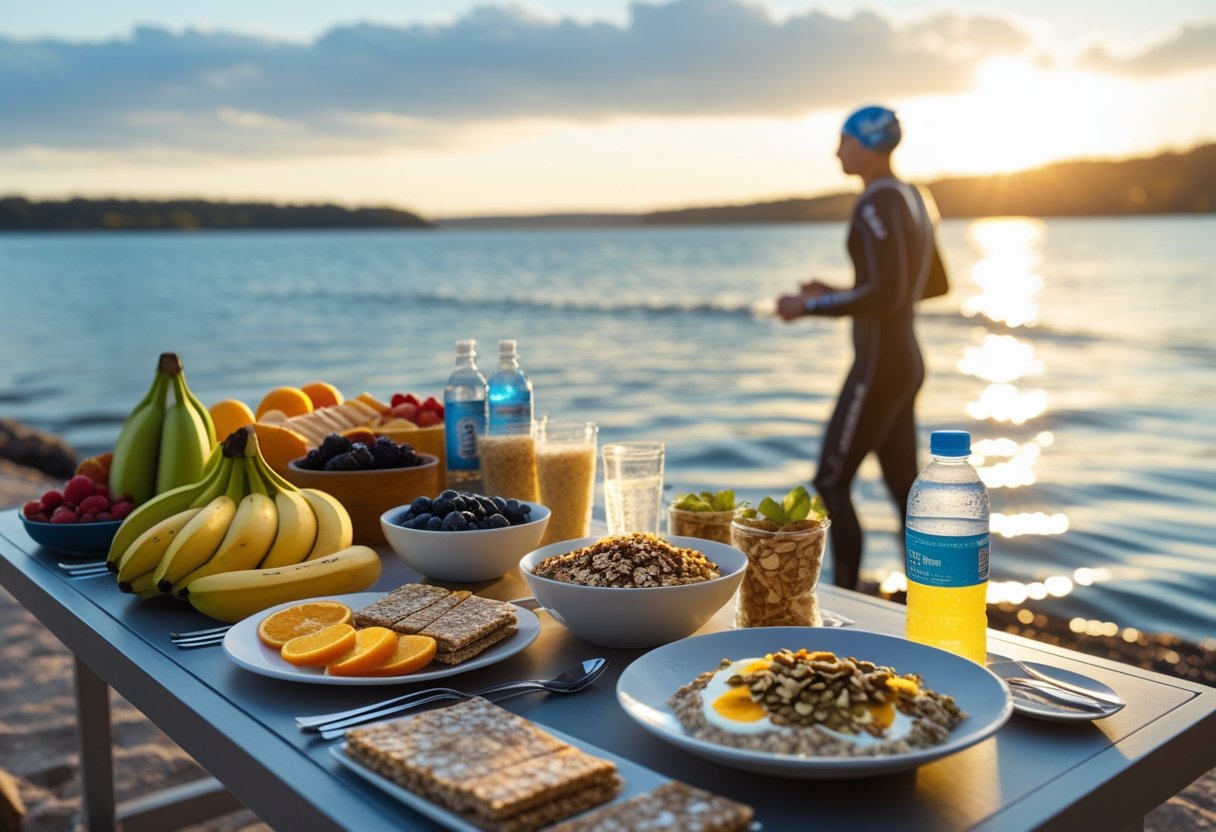
Swimming in open water demands more energy than pool swimming due to variables like currents, waves and temperature changes. A well-planned nutrition strategy should include carbohydrate-rich foods that provide sustained energy without causing digestive discomfort. Many experienced swimmers rely on a mix of whole foods and specialised nutrition products such as energy drinks and bars that deliver quick energy without the bulk of heavier foods.
Key Takeaways
- Prioritise carbohydrate-rich foods like bananas, oats and energy gels to maintain energy levels throughout your open water swim race.
- Establish a consistent fuelling schedule with easily digestible foods to avoid digestive issues whilst maximising performance in challenging conditions.
- Proper hydration with electrolyte-balanced drinks is essential before, during and after swimming to maintain optimal physical function in open water environments.
Understanding Nutrition for Open Water Swim Races
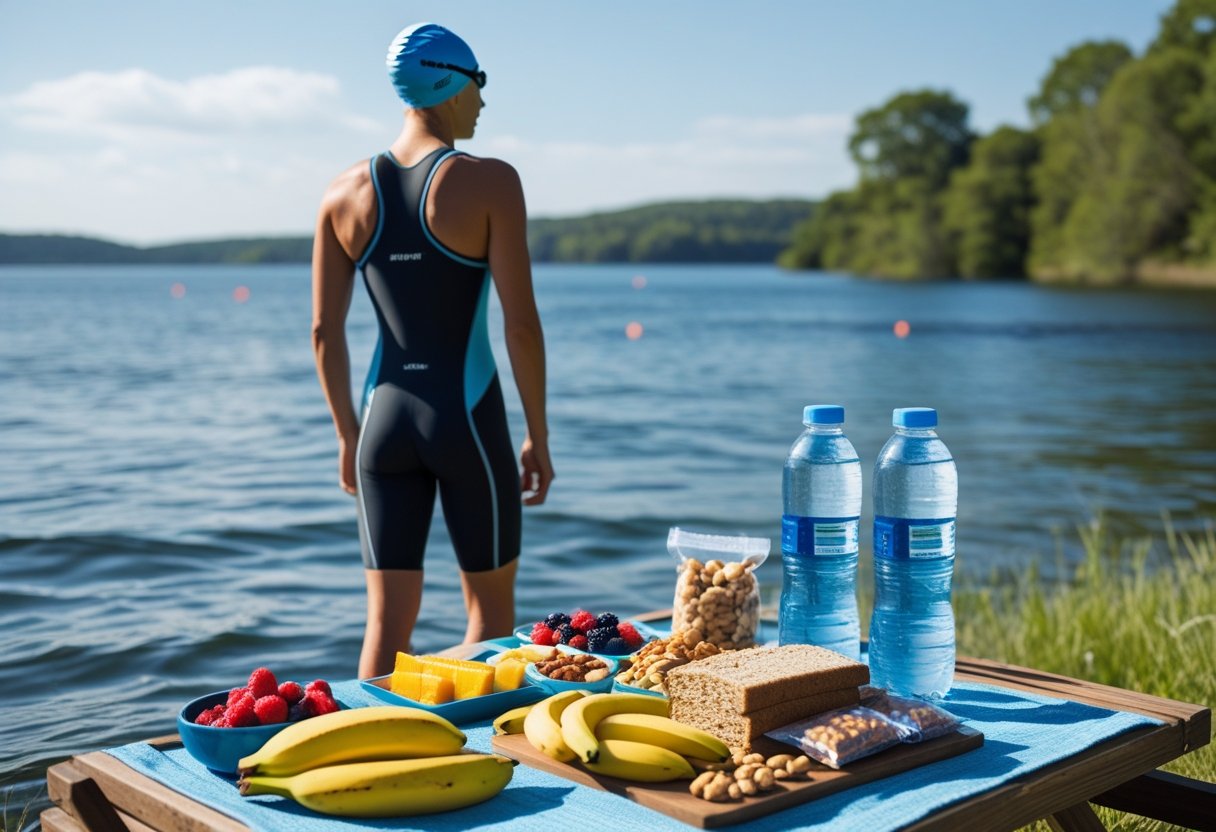
Proper nutrition plays a critical role in performance during open water swim races. The right nutritional approach can significantly impact your energy levels, endurance, and recovery during these demanding events.
Key Nutritional Requirements for Endurance Sports
Open water swimming demands specific nutritional preparation as an endurance sport. Swimmers need adequate energy intake that matches the high caloric expenditure of prolonged swimming. Most endurance athletes require 3,000-5,000 calories daily during training periods.
Water-based endurance sports have unique requirements due to the cooling effect of water and constant movement. Unlike land sports, swimmers face challenges consuming nutrition during the event itself.
Timing matters significantly. Pre-race nutrition should focus on optimising glycogen stores, while race-day nutrition requires easily digestible foods that provide sustained energy without causing gastrointestinal distress.
Hydration remains crucial despite being surrounded by water. Electrolyte balance must be maintained, especially in saltwater environments where dehydration can occur surprisingly quickly.
The Role of Carbohydrates, Proteins, and Fats
Carbohydrates provide the necessary energy for swimming performance and should comprise 55-65% of an open water swimmer’s diet. Complex carbs like whole grains, fruits and vegetables offer sustained energy release.
Before races, focus on easily digestible carbohydrates. Energy drinks, gels and bars provide convenient carbohydrate sources without the heaviness of solid foods.
Protein supports muscle repair and should make up 15-20% of your diet. Aim for 1.2-1.6g per kg of body weight daily, focusing on quality sources like lean meats, fish, eggs and plant proteins.
Healthy fats (20-30% of diet) provide concentrated energy and support vitamin absorption. Include sources like avocados, nuts, seeds and oily fish for omega-3 fatty acids that help reduce inflammation.
Energy Demands of Open Water Swimming
Open water swimming burns 600-1,000+ calories per hour depending on intensity, water conditions and body composition. This high energy expenditure requires strategic fuelling.
Cold water swimming increases caloric needs further as your body works to maintain core temperature. Swimmers may need up to 25% more calories in cold conditions compared to temperate waters.
Longer races (5km+) necessitate in-swim nutrition strategies. Feeds typically occur every 30-45 minutes using liquid carbohydrates that provide quick energy without digestive strain.
Dietary variation is important for maintaining consistent energy levels. Include a mix of raw and cooked vegetables, grains, legumes, seeds and nuts in your regular diet to support training demands.
Race-day energy management is crucial. Start with topped-up glycogen stores from pre-race carbohydrate loading, then maintain energy through strategic intake during the event to prevent hitting the wall.
Carbohydrate Strategies and Glycogen Loading
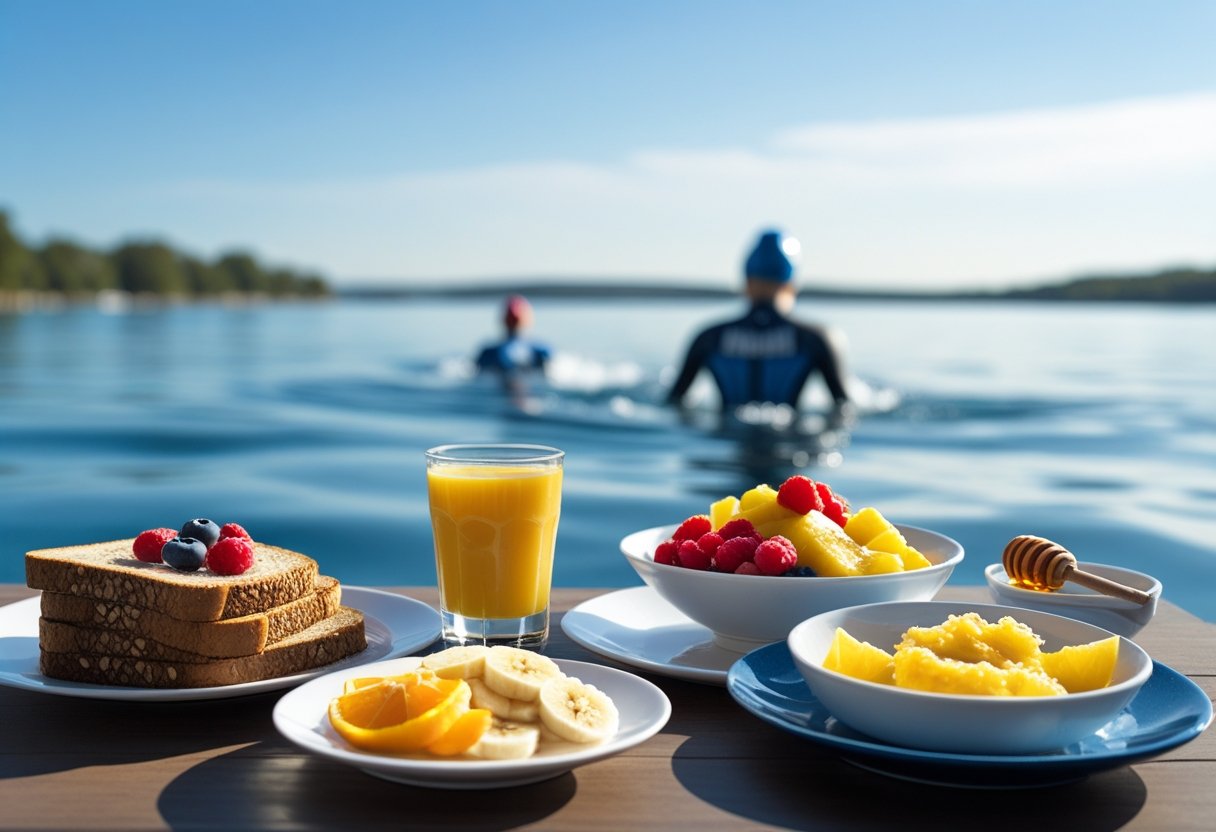
Proper carbohydrate intake is crucial for open water swimmers to maintain energy levels throughout races. Carbohydrates serve as the primary fuel source during prolonged swimming, with glycogen stores providing immediate energy when needed.
Importance of Glycogen Stores
Glycogen is the stored form of glucose in your muscles and liver. When swimming long distances, your body relies heavily on these glycogen stores for energy. Without adequate stores, you may experience “hitting the wall” or fatigue much earlier than expected.
Studies show that glycogen depletion can occur after 60-90 minutes of intense swimming, making proper loading essential for races lasting longer than an hour. Well-stocked glycogen stores can improve endurance by up to 20% and help maintain technique when fatigue sets in.
For open water swimmers, maintaining sufficient glycogen stores should be a priority in any nutrition plan, especially in the days leading up to competition.
Effective Carbohydrate Intake
For optimal performance, swimmers should aim for 8-10g of carbohydrate per kilogram of body weight daily during heavy training periods. This means a 70kg swimmer needs approximately 560-700g of carbohydrates daily.
Timing is crucial:
- 3-4 days before race: Begin increasing carbohydrate intake
- 24 hours pre-race: Focus on easily digestible carbs
- 2-3 hours before swimming: Consume 1-4g/kg of carbohydrates
- During longer swims: Aim for 30-60g of carbs per hour
Breakfast should be consumed 2-3 hours before race time, consisting primarily of carbohydrates to top up glycogen stores. For ultra-distance events, additional carbohydrate loading may be necessary.
Best Types of Carbohydrates for Swimmers
Not all carbohydrates are created equal when it comes to swimming performance. Complex carbohydrates provide sustained energy, while simple carbs offer quick glucose spikes.
Ideal pre-race carbohydrate sources:
- Porridge with honey and banana
- Wholegrain toast with jam
- Rice or pasta with lean protein
- Sweet potatoes
- Fruits like bananas and berries
During longer swims, easily consumable carbohydrates are essential. Energy gels, sports drinks, jellied sweets and bananas are excellent options that can be quickly digested while swimming.
For post-swim recovery, combine carbohydrates with protein in a 3:1 ratio to replenish glycogen stores effectively. This might include a plate containing rice, pasta or potatoes alongside fresh vegetables and protein.
Protein and Micronutrient Considerations
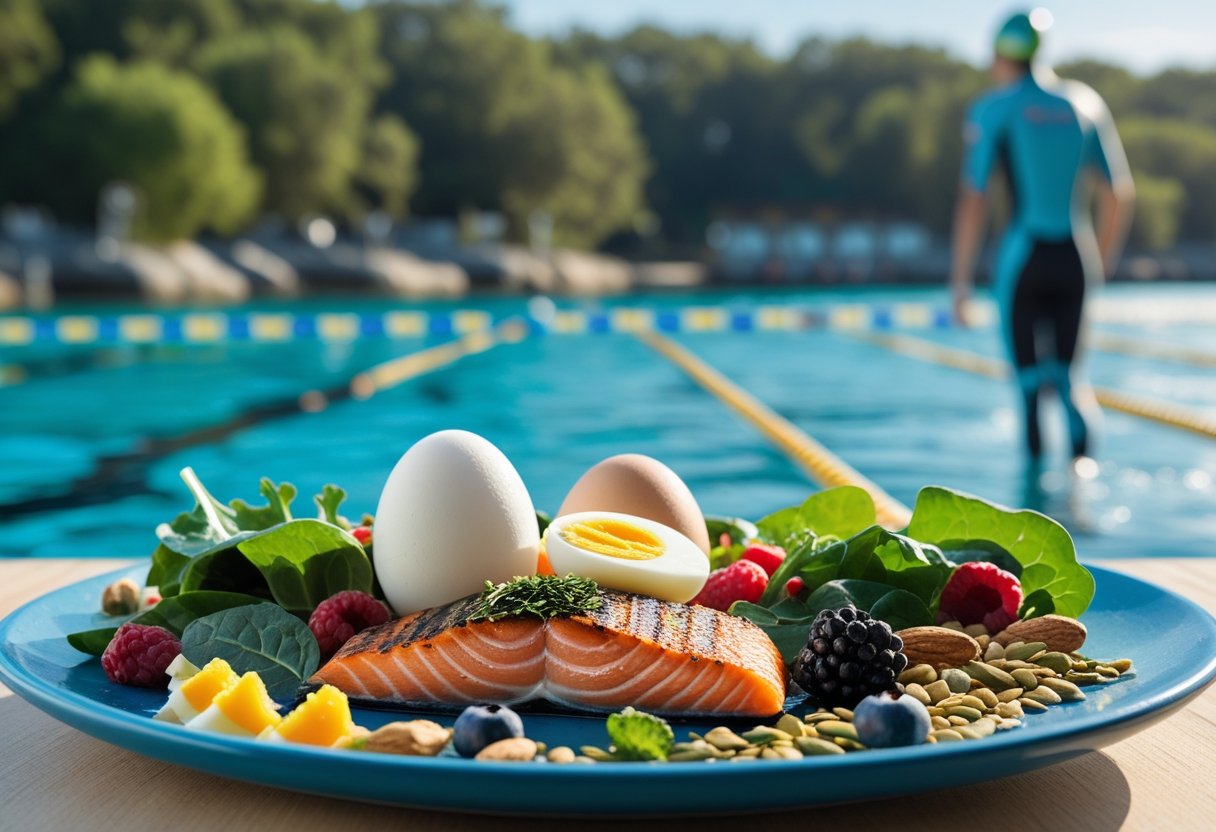
Swimmers need specific nutrients to perform at their best in open water events. Getting enough protein helps muscles recover, while micronutrients like iron support oxygen delivery during long swims.
Optimal Protein Sources for Recovery
After intense open water swimming, your body requires adequate protein to repair muscle tissue and promote recovery. Most swimmers need about 1.2-1.6g of protein per kg of body weight daily, with timing being crucial for optimal benefits.
Top protein sources for swimmers:
- Lean poultry and fish (20-25g protein per 100g)
- Greek yoghurt (10g protein per 100g)
- Eggs (6g protein per egg)
- Plant-based options like lentils and tofu
Consuming protein within 30 minutes after swimming helps maximise muscle repair. Well-chosen vegetarian diets can absolutely meet an athlete’s protein needs when properly planned.
Consider spreading protein intake throughout the day rather than consuming it all at once for better absorption and utilisation.
Iron and Other Essential Micronutrients
Iron is particularly important for open water swimmers as it helps transport oxygen to working muscles during extended efforts. Female swimmers and those training heavily are at higher risk of deficiency.
Key micronutrients for swimmers:
- Iron: Found in red meat, spinach and fortified cereals
- Calcium: Essential for muscle contraction and bone health
- Magnesium: Supports muscle function and energy production
- Vitamin D: Crucial for immune function and bone health
A diet with plenty of fruits, vegetables, and whole grains provides most micronutrients swimmers need. Iron supplements should only be taken when prescribed by a healthcare provider after testing.
Swimmers should focus on getting a variety of colourful foods in their diet to ensure adequate micronutrient intake rather than relying solely on supplements.
Pre-Race Nutrition Planning
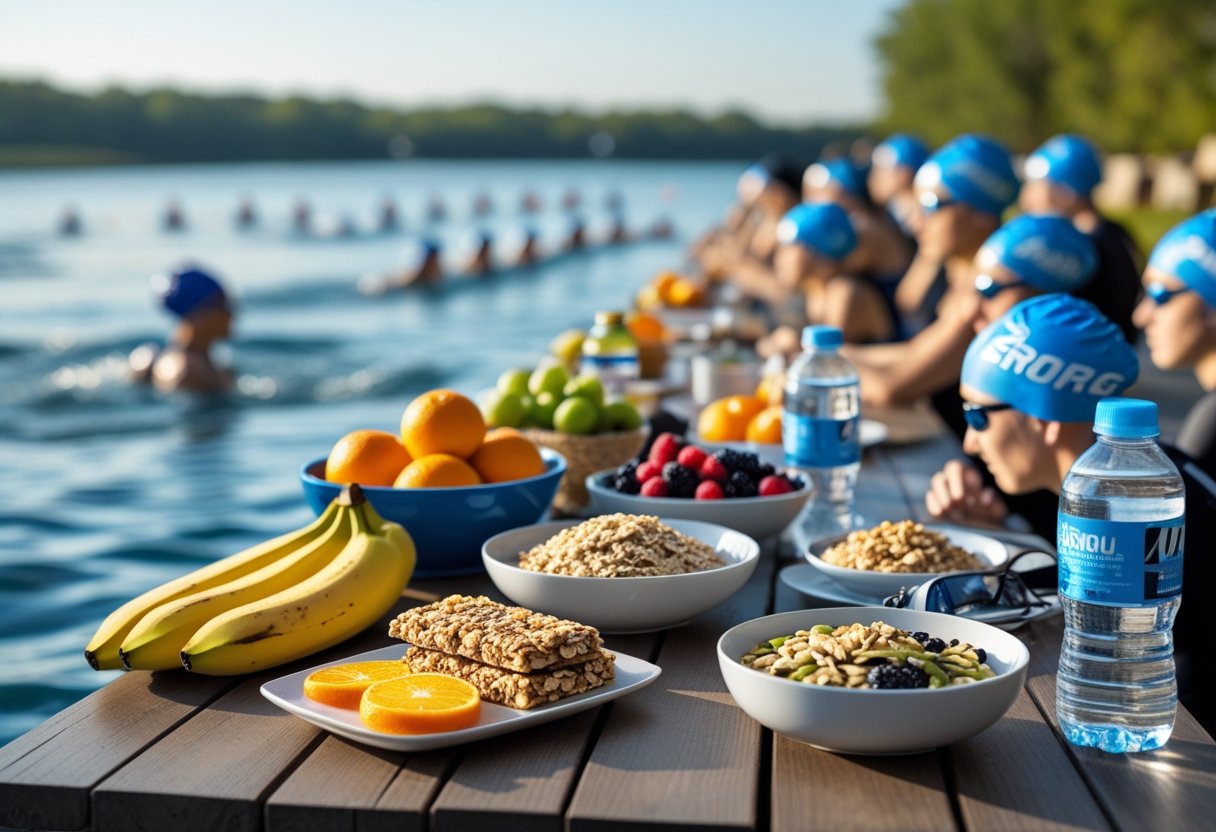
Proper nutrition before an open water swim race directly impacts performance and endurance. Planning your meals strategically and focusing on the right nutrients will help maintain energy levels throughout your swim.
Meal Timing and Composition
The days leading up to your race are crucial for storing energy. Aim to increase your carbohydrate intake to about 8g per kg of body weight starting three days before the event. This process, often called carbohydrate loading, fills your muscle glycogen stores.
Focus on lower-GI foods for sustained energy release during your training period. These include:
- Whole grain pasta and bread
- Brown rice
- Oats
- Sweet potatoes
Protein is also important but in moderate amounts. Include lean sources like chicken, fish or plant proteins with each meal to support muscle repair.
Hydration is equally vital. Drink 2-3 litres of water daily in the lead-up to race day, adjusting for training intensity and weather conditions.
Fueling the Morning of the Race
On race day, timing is everything. Eat your main pre-race meal 2-3 hours before the start to allow for proper digestion. Fast-digesting carbohydrates are ideal about an hour before your swim.
Good morning-of options include:
- Banana with a small amount of nut butter
- Low-fibre cereal with milk
- Toast with honey
- Porridge with berries
Avoid high-fat and high-fibre foods that might cause digestive discomfort during your swim. Many swimmers find that energy drinks or gels taken 15-30 minutes before the race provide a final energy boost without stomach heaviness.
Aim for approximately 300-500 calories in your pre-race meal, depending on your body size and the race distance.
Hydration and Electrolyte Management
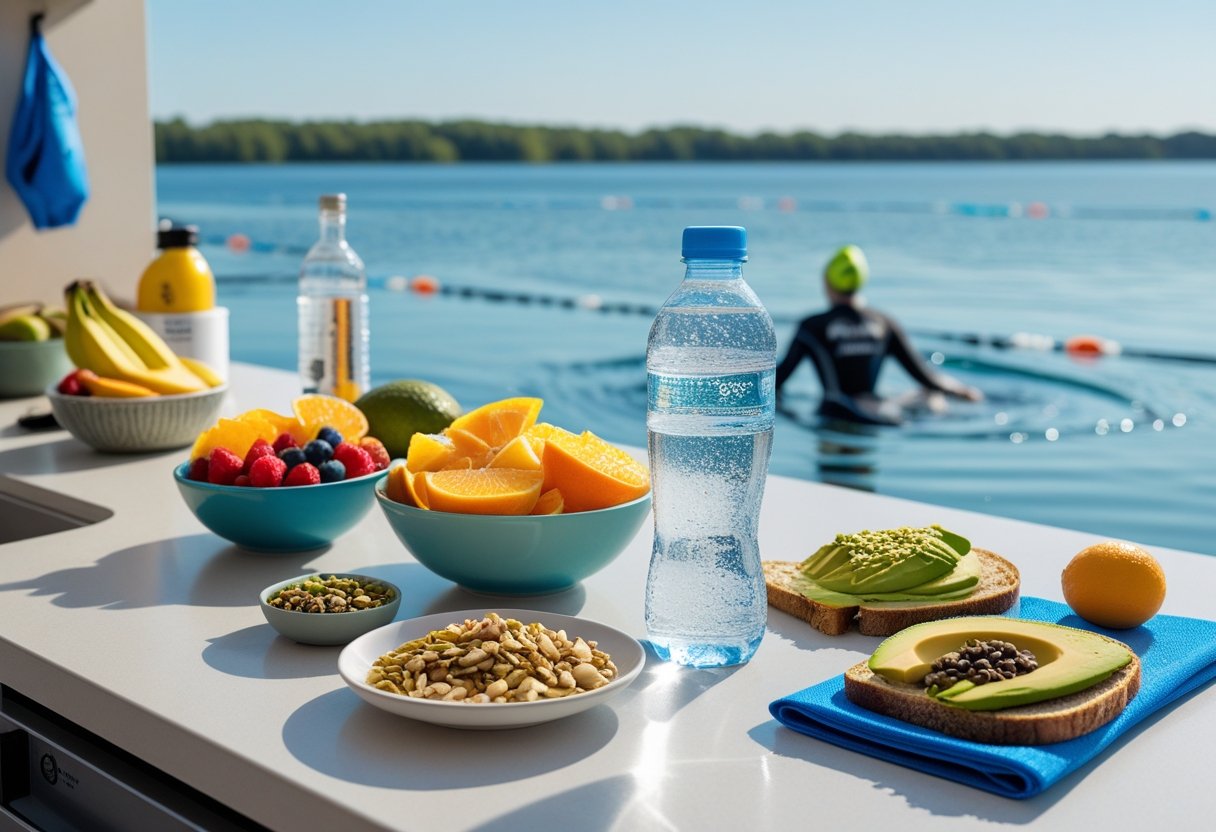
Proper fluid balance and electrolyte levels are crucial for maintaining performance during open water swimming. These elements work together to prevent dehydration and muscle cramping that can derail even the most prepared swimmer.
Maintaining Proper Hydration
Open water swimmers need to establish a consistent hydration strategy before, during, and after their swim. Begin hydrating at least 24 hours before your race, aiming for clear or light yellow urine as an indicator of good hydration status.
During longer swims (over one hour), try to consume approximately 200-300ml of fluid every 20-30 minutes. Carbohydrate-electrolyte sports drinks are ideal as they provide both hydration and energy in one solution.
Don’t wait until you feel thirsty to drink—this is often too late. Practise your hydration strategy during training swims to ensure your body adapts to processing fluids whilst swimming.
After your swim, replace lost fluids by drinking about 1.5 times the amount of weight lost during exercise. This helps optimise recovery and prepares you for your next training session.
The Role of Salt Tablets and Electrolytes
Electrolytes—particularly sodium, potassium, magnesium and calcium—are essential minerals that help maintain fluid balance and prevent muscle cramps during extended swimming sessions.
Electrolyte drinks are particularly important for open water swims lasting more than an hour. These specialised beverages help replace the minerals lost through sweat, even in cold water.
Salt tablets can be beneficial for swimmers who sweat heavily or participate in events lasting over 2 hours. They typically contain:
- Sodium (primary electrolyte lost in sweat)
- Potassium (helps maintain heart and muscle function)
- Magnesium (prevents muscle cramps)
For swims lasting 1-3 hours, aim to consume 500-750mg of sodium per hour alongside adequate fluids. This can come from sports drinks, gels, or salt tablets depending on your preference and digestive tolerance.
Test any electrolyte supplements during training—never try new products on race day.
Foods and Supplements to Avoid

While proper nutrition is crucial for open water swimming, certain foods and supplements can impair your performance or pose health risks. These items can cause digestive distress, energy crashes, or other negative effects that may compromise your race.
Ingredients That Can Hinder Performance
High-fibre foods should be avoided in the hours before your swim as they can cause digestive issues during your race. Items like beans, whole grains, and certain vegetables may lead to bloating or stomach cramps in the water.
Foods high in fat content should also be limited pre-race. These take longer to digest and may cause discomfort during intense swimming. Fried foods, heavy dairy products, and fatty meats can slow digestion and reduce your energy efficiency.
Caffeine in large amounts might increase dehydration risk and cause jitters or anxiety before your race. Sugary foods can cause rapid energy spikes followed by crashes, leaving you fatigued mid-swim.
Alcohol should be avoided completely before racing as it impairs coordination and promotes dehydration.
Unproven Supplements and Their Risks
Many supplements make bold claims about enhancing swimming performance without scientific backing. Proprietary “energy-boosting” blends often contain untested ingredients that might interact poorly with your body during intense exercise.
Pre-workout supplements with high stimulant content can elevate heart rate excessively, potentially dangerous during endurance swimming. Some supplements may also contain banned substances that could lead to disqualification in competitive events.
Fat-burning supplements rarely work as advertised and may cause nausea or digestive distress during your swim. Similarly, untested “performance enhancers” might contain harmful ingredients not listed on labels.
Instead of relying on questionable supplements, focus on proven nutrition strategies like properly timed carbohydrates and hydration for optimal swimming performance.
Adapting Nutrition for Training and Race Day
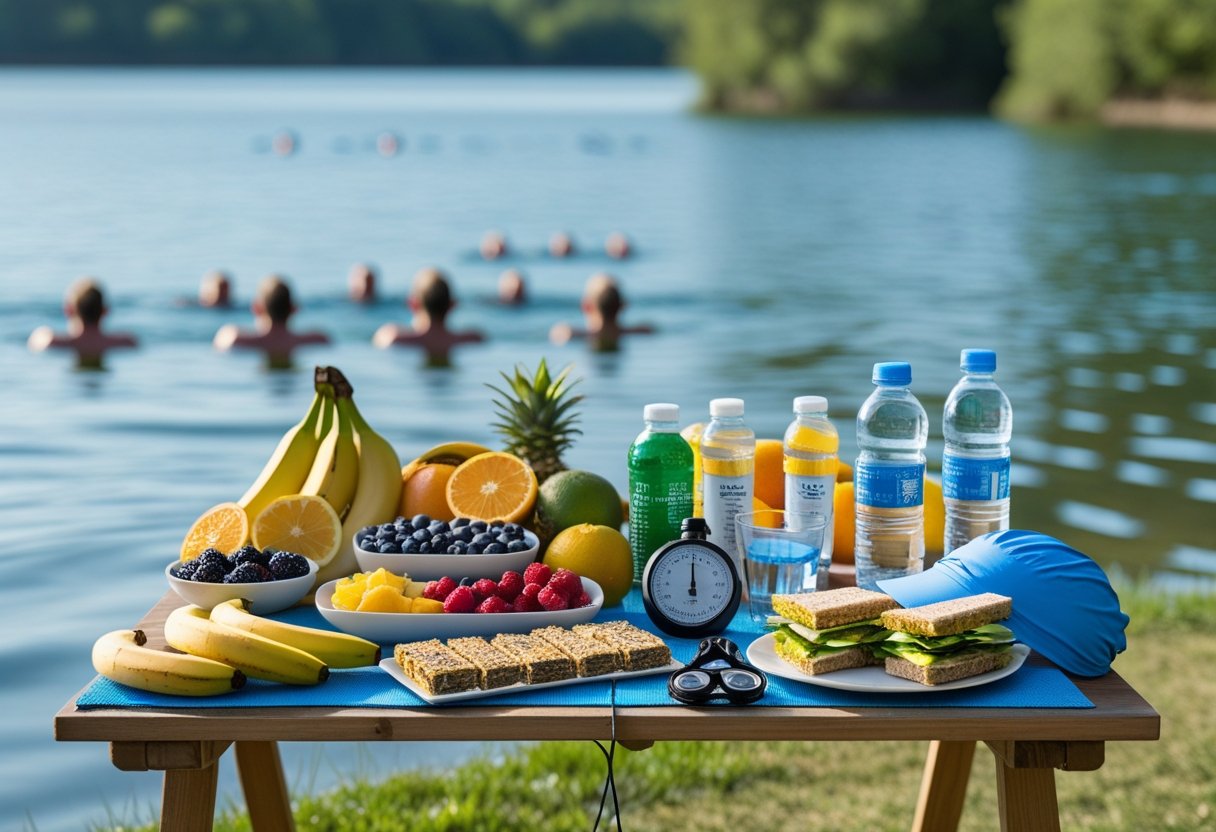
Successful nutrition strategies for open water swimming require careful planning and customisation based on individual needs and event demands. The right approach balances energy requirements with digestive comfort in the unique environment of open water competition.
Experimenting with Nutrition During Training
Finding your optimal nutrition plan requires methodical testing during training sessions. Start by incorporating different carbohydrate sources to identify what works best for your body. Energy drinks, gels and bars offer convenient options to supplement energy without the heaviness of whole foods.
Track your energy levels, digestive comfort and performance outcomes with each nutritional approach. Many swimmers find success with a mix of:
- Simple carbohydrates for immediate energy
- Complex carbohydrates for sustained release
- Small amounts of protein to reduce muscle breakdown
Training sessions that mimic race conditions provide the ideal opportunity to fine-tune your nutrition timing. Practise your hydration strategy alongside food intake, aiming to maintain a consistent eating schedule as recommended for open water preparation.
Adjusting for Different Endurance Events
Nutritional requirements vary significantly based on event duration and intensity. For shorter races (under 5km), focus on pre-race carbohydrate loading and hydration. Longer events demand ongoing fuelling strategies during the swim.
Marathon swims and triathlons require carefully timed nutrition breaks. Plan for approximately 30-60g of carbohydrates per hour for events lasting beyond 90 minutes. Water temperature affects your nutritional needs significantly:
| Water Temperature | Nutritional Considerations |
|---|---|
| Cold (below 18°C) | Higher calorie intake needed for thermoregulation |
| Moderate (18-24°C) | Balanced intake with regular hydration |
| Warm (above 24°C) | Increased electrolyte replacement, lighter digestion load |
For multi-stage events, prioritise rapid recovery nutrition between segments. Competition nutrition should optimise pre-race hydration and glycogen stores, with reliable self-supplied fuel sources available during the event.
Conclusion
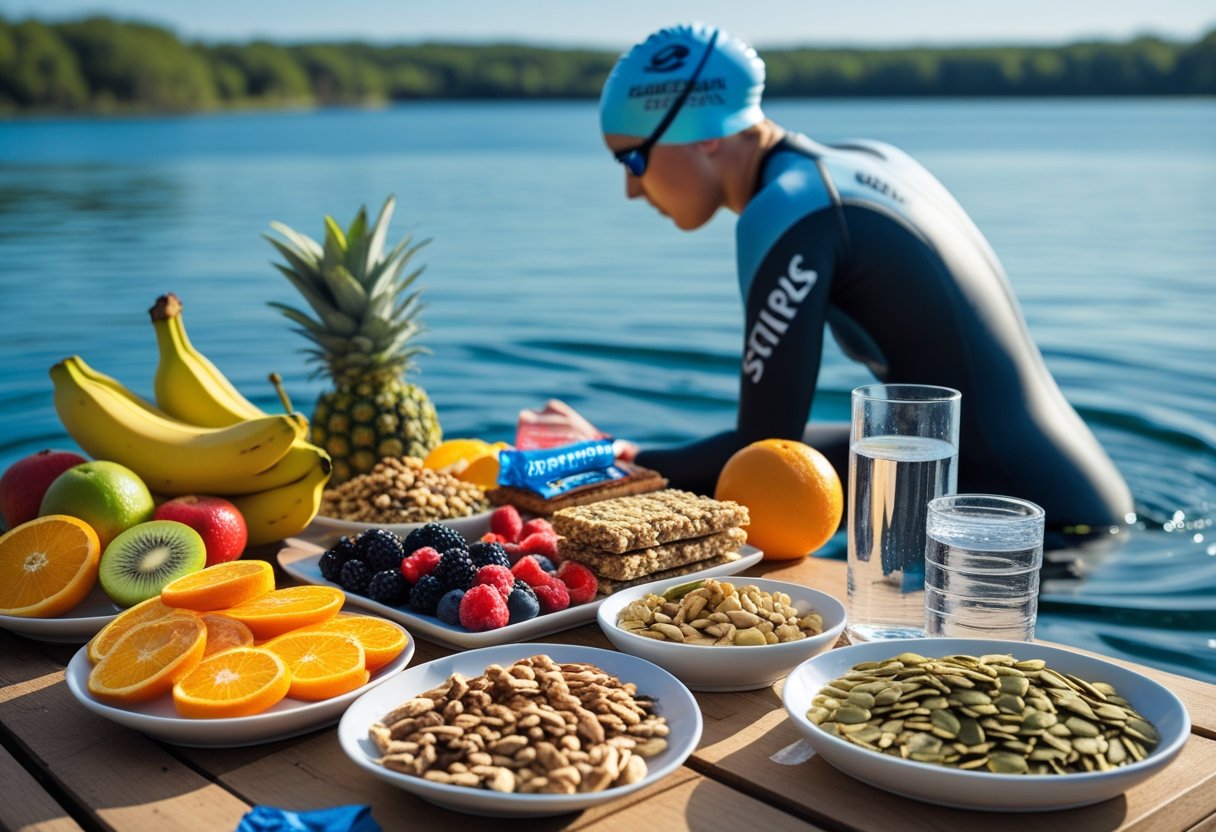
Proper nutrition is crucial for open water swimming success. Fuelling your body with the right foods at the right times can significantly impact performance and recovery.
Carbohydrates remain the primary fuel source for swimmers. Aim for 30-60 grams per hour during longer swims to maintain energy levels and prevent fatigue.
Hydration cannot be overlooked. Drink water consistently before your swim and consider sports drinks for events lasting over an hour to replace electrolytes.
For pre-race nutrition, focus on easily digestible foods 2-3 hours before your swim. Bananas, yoghurt, and whole grains provide sustained energy without causing stomach discomfort.
Post-swim recovery nutrition should include protein and carbohydrates within 30 minutes of finishing. This helps muscle repair and glycogen replenishment.
Every swimmer is unique. Experiment with different foods during training—never on race day—to discover what works best for your body.
Building a diet rich in fruits, vegetables, lean proteins and good fats creates the nutritional foundation needed for consistent swimming performance.
Remember that nutrition is highly individual. Listen to your body and adjust your fuelling strategy based on your specific needs and the demands of your event.

